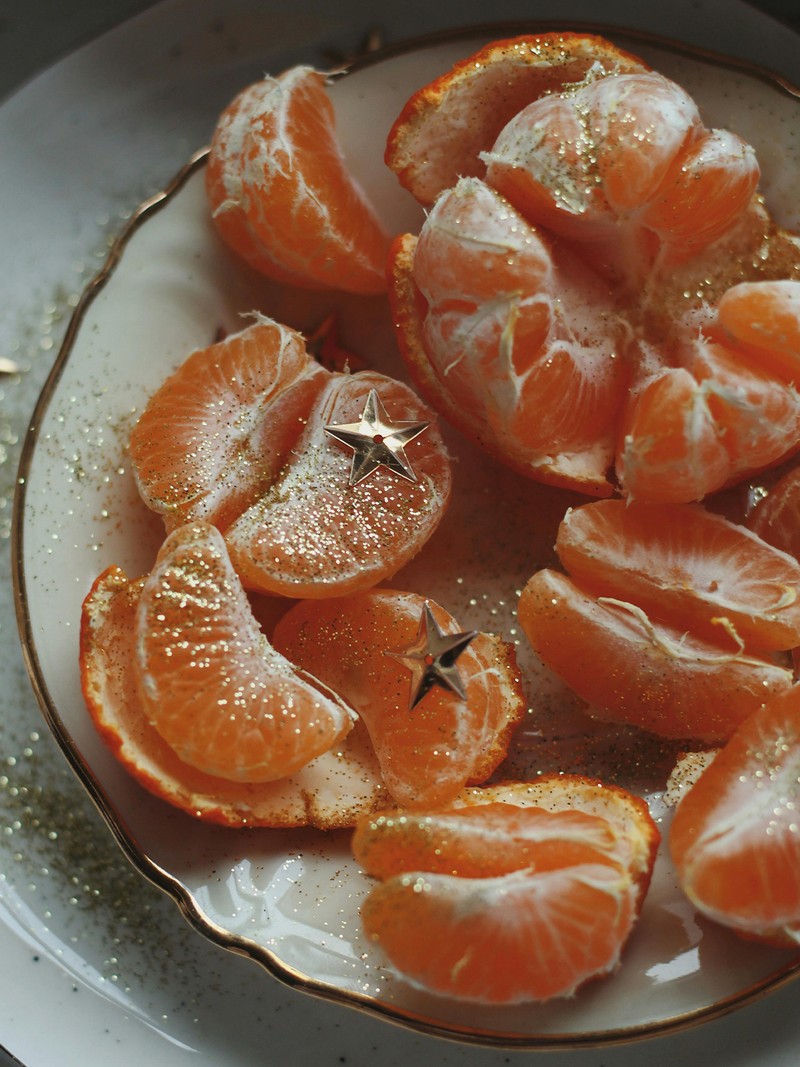
An Expert Guide To Staying Healthy Over Christmas
Strike A Balance
“Eating well doesn’t need to mean a perfect diet all the time. Eating nutritious and balanced meals 80% of the time is a great goal. If you consider we have an average of three meals per day and December has 31 days, this makes a total of 93 meals. I’ll let you do the maths, but there’s plenty of room for meals and treats without falling off the wagon completely. Don’t deny yourself a treat if you really crave it – this will only make you want it even more. Where you can, opt for high-quality foods. A homemade mince pie, for example, won’t contain as many preservatives and hydrogenated fats as a supermarket version.” – Lucia Stansbie, nutritional therapist
Balance Your Booze
“Overindulging during the festive season can be tempting, but a simple strategy to stay balanced is to alternate alcoholic beverages with non-alcoholic ones – a method sometimes called ‘zebra striping’. This helps reduce the risk of hangovers, sustain your energy, and support your overall well-being. Other tips include: avoid drinking on an empty stomach; add ice to your drinks to dilute them slightly; and stay hydrated throughout the evening.” – Maz Packham, nutritional therapist
Be Zero Per Cent Savvy
“It’s no secret that alcohol is full of empty calories, but that doesn’t mean anything that’s alcohol-free is always a better option. While alcohol-free drinks will have fewer calories due to the lack of ethanol (alcohol contains 7 calories per gram, on a par with fat), they usually have a far higher sugar content, which can quickly add up. There’s no need to drink water all evening, but it’s worth looking into lower-sugar options, such as mocktails made with kombucha, water kefir and switchels, which are drinks based on apple cider vinegar.” – Lucia
Make Simple Swaps
“We tend to eat differently at this time of year with more treats, puddings, festive drinks and canapés creeping into the diet. It’s fine to have the odd treat, but you can also make some clever swaps. Swap smoked salmon blinis for cucumber topped with sour cream, salmon and chives; swap pigs in blankets for prunes wrapped in Parma ham; swap creamy dips and crisps for fresh vegetable crudites with homemade hummus; and swap roasted nuts for crispy chickpeas.” – Dominique Ludwig, nutritionist
Offset Indulgence
“Balance your plate by adding prebiotic-rich foods like onions, garlic and leeks to your festive recipes – they’re fantastic for feeding the good bacteria in your gut. Fermented foods like sauerkraut and kimchi make great side dishes, adding a tangy kick and a dose of probiotics to your plate. These gut-friendly ingredients help balance your microbiome, even if you indulge in a little extra dessert.” – Rosie Millen, nutritionist & Verve brand ambassador
Load Up On Purple Fruit & Veg
“Cranberries, beetroot, red cabbage, pomegranate and radicchio all contain anthocyanins, a powerful antioxidant known to support heart health and balanced blood sugar. Cranberries in particular are worth stocking up on – they’re a source of more than 50 minerals and are one of the fruits with the highest levels of antioxidants. Add them to your morning yoghurt or porridge. Also, try swapping regular potatoes for sweet potatoes, which are richer in antioxidants, or a mix of root vegetables, such as carrots, parsnips and swede, to increase the number of antioxidants and different kinds of fibre that will nourish your good gut bacteria.” – Lucia
Downsize Festive Treats
“It’s so simple but consider buying mini mince pies instead of regular ones. An average mince pie has roughly 289 calories whereas a mini mince pie has approximately 82 calories. So, by swapping to a mini version you can save yourself 207 calories while still enjoying the flavour.” – Louise Bula, specialist dietitian
Eat Seasonally
“Broccoli, Brussels sprouts, Swiss chard and cauliflower are in their prime now, and happen to be some of the most nutrient-dense vegetables. They’re rich in fibre, which keeps you fuller for longer and your bowel movements regular, which is helpful when you have days of overindulgence. They’re also good sources of vitamins A, C and E, all of which help the body fight illness and infection. Try roasting sprouts in high-quality olive oil with chestnuts, another great source of seasonal fibre. Clementines, satsumas and tangerines are all rich in vitamin C, which is vital for immunity. Enjoy with Greek yoghurt, nuts and seeds. Parsnips are also a good source of fibre, manganese and folic acid. As with all root veg, keep the skin on for additional fibre and nutrients.” – Xuxa Milrose, nutritionist at OMNI Wellness
Be Prepared When Travelling
“Don’t rely on petrol station or train food in a rush. Food flasks are a godsend for travelling. I love to make a thick lentil soup and throw in fried halloumi squares for extra protein and a pack of oatcakes for healthy carbs. Overnight oats travel well in a recycled jam jar, while making your own sandwich with a wholegrain wrap or pitta bread will mean you don’t have to resort to unhealthy options.” – Dominique
Time Your Sugar Intake
“If your office or home is filled with sweet treats, it’s far too easy to snack on them between meals for a quick pick-me-up. But once you start, it can be hard to stop. Plus, research shows eating sugary foods on an empty stomach can lead to greater blood sugar spikes. If you do want a sweet treat, eat it after, not before, a meal. A meal acts as an obstacle course in the stomach, which slows the speed at which we absorb glucose, so a sugary treat will have less of an impact.” – Dominique
Get Plenty Of Sleep
“A lack of sleep can increase production of the stress hormone, cortisol, which affects the gut. Plus, when we are sleep deprived, we’re more likely to choose less nutritious foods for a quick energy boost – think processed carbs and sugar – which will negatively impact energy levels and mood. In fact, research shows that sleep deprivation increases your calorie intake the following day by around 385 calories.” – Xuxa
Stay Committed To Daily Habits
“The festive season is often a sociable one filled with drinks and dinner invites. Think about how you can be sociable but also stick to your daily habits that make you feel good, such as swapping drinks with a friend for a walking date – grab your trainers, a coffee and head outside.” – Maz
Eat Mindfully
“Get into the habit of taking a few deep breaths before eating. Deep exhalations stimulate the vagus nerve, which is responsible for the key connection between the gut and the brain. Doing a few deep belly breaths before eating a meal will put your mind and body in a calm and relaxed state, telling your brain that you’re ready to eat, and optimising digestion and nutrient absorption.” – Xuxa
Pay Attention To Hunger Cues
“Don’t feel you have to eat food just because it’s there. Most ‘non-hunger’ eating occurs during social occasions because food is unavoidable, or when we’re bored at home in those limbo days between Christmas and New Year when the cupboards are stocked full of cheese, biscuits and chocolate. Pause and ask yourself if you are hungry. Chew slowly and thoroughly, enjoying and savouring each mouthful.” – Xuxa
Supplement Wisely
“A vitamin D supplement is a must at this time of the year. Mingling with more people can spread germs, and vitamin D supports immunity, making it a wise seasonal choice. I rate BetterYou’s Vitamin D and K2.” – Dominique
Plan Ahead
“If you want to enjoy the festive season with as little stress (and as much energy) as possible, planning ahead and being realistic with what you can fit in is key. This forward planning extends into the new year, so think about how you want to start the year and set yourself up for success by pre-booking your gym class or stocking the fridge with nutritious whole foods.” – Maz
Have A Hangover SOS Plan
“Eating before drinking is essential. A meal like roasted salmon with a baked sweet potato and a kale, avocado and pumpkin seed salad will provide protein, complex carbs and healthy fats to help your body process alcohol more efficiently. If you overdo it, make sure avocado and bananas are on the menu. Both are rich in potassium, an important mineral that can help rebalance electrolytes. Ginger is an effective remedy for nausea and can soothe an upset stomach, while Brazil nuts are rich in selenium, which can reduce the inflammation associated with a hangover. If you’ve had one too many late nights, getting outside and into fresh air is crucial to regulate your circadian rhythm.” – Xuxa
End Your Day Well
“If you can, finish the day by going for a post-dinner stroll. Movement is magic for your gut. After a big meal, a 20-minute walk can help stimulate digestion and prevent that dreaded Christmas bloat. It’s also a great way to clear your head and enjoy some fresh air – bonus points if it’s with family or friends.” – Rosie
Don’t Stress
“Go into Christmas with the mentality that you are going to enjoy yourself, try a bit of everything in moderation and relax. There will be plenty of time to get back on track. Remember significant weight gain – i.e. actual fat gain – doesn’t happen overnight or in a week. If you gain a few pounds, chances are once you get back to your routine, your weight will naturally fall back to where it was before.” – Louise
For more from the experts, visit DOMINIQUELUDWIG.COM, NOURISHFULNUTRITION.COM, MISSNUTRITIONIST.COM, FOODPOWERNUTRITION.COM & OMNI-WELLNESSGROUP.CO.UK & follow @LOUISETHEDIETITIAN
DISCLAIMER: Features published by SheerLuxe are not intended to treat, diagnose, cure or prevent any disease. Always seek the advice of your GP or another qualified healthcare provider for any questions you have regarding a medical condition, and before undertaking any diet, exercise or other health-related programme.
DISCLAIMER: We endeavour to always credit the correct original source of every image we use. If you think a credit may be incorrect, please contact us at info@sheerluxe.com.





